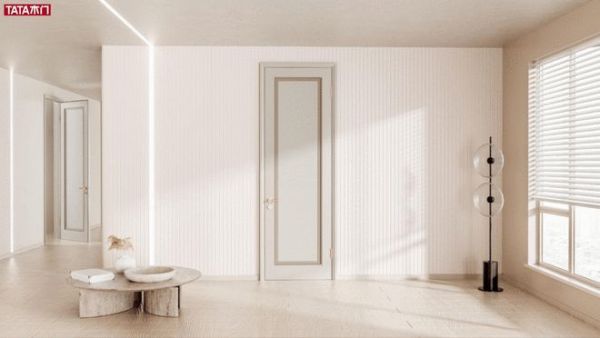TATA市场革新:对话纵瑞原探秘策略
Home Materials Industry Challenges and TATA木门's Strategies Home Materials Industry Struggles and TATA木门's Strategic Resilience
In recent years, the home materials industry has faced significant challenges, struggling with overall weakness. Influenced by factors such as slowing global economic growth, a weakened real estate market, and waning consumer confidence, the industry has experienced poor development, with some sectors even showing negative growth.
The fluctuation in raw material prices, rising supply chain costs, and stricter policies have further compressed the profit margins of businesses. Many small and medium-sized enterprises have been in trouble due to tight cash flow and reduced orders, and some have been forced to exit the market. Even leading enterprises in the industry are普遍 facing weak performance.
As a leading brand in the wood door industry, TATA木门 has also been under immense pressure from the changing environment, pressing forward despite the challenges over the past year. As an industry leader, how does TATA木门 view the market development in 2025 and beyond? What measures should be taken to drive the brand and performance to new heights?
Recently, NetEase Home visited TATA木门, where NetEase Home & NetEase Design National Editor-in-Chief Hu Yanli and NetEase Home Executive Editor Zhang Lu engaged in a dialogue with TATA木门 Chairman Zong Ruiyuan, exploring the path of refined innovation for TATA木门 in the face of normalized market conditions.

Market Entering Normalization, Companies Need to Grasp the Rhythm
According to relevant data, from 2023 to the end of 2024, the customer base for home materials has decreased by about 30%, and in the third quarter of 2024, it was even more pronounced. The growth momentum of the home materials industry has weakened, and businesses are facing unprecedented challenges.
"TATA木门, like many other companies, pressed forward under pressure in 2024," revealed Chairman Zong Ruiyuan. "The 'national subsidy' policy at the end of the year helped, otherwise, the data for most companies would have been even worse."
For market trends in 2025 and beyond, Zong Ruiyuan also made predictions, "I believe the market will not see another 30% decline like last year, as there is still strong demand."
Zong Ruiyuan stated that the home materials market will gradually enter a stage of 'normalization.' "This means that the era of high-speed growth has ended, and the market will return to rationality, with more intense competition."
Zong Ruiyuan explained that although China's demographic dividend is gradually weakening, it has not disappeared entirely. In the future, market demand will show relatively stable peaks and troughs. If businesses cannot accurately grasp the market rhythm, they may face even greater pressure; conversely, if they can hit the market rhythm, they will be in a more advantageous position in competition.
The traditional extensive growth model is a thing of the past, and in the normalized development stage, businesses must engage in refined management transformation for growth. Zong Ruiyuan said that the market's return on investment curve is undergoing structural changes – from the linear relationship between input and output to a fluctuating nonlinear relationship. This change requires businesses to reconstruct their business logic, accept and adapt to new market rules, and establish an operation system and competitive strategy that match the normalized market.

Optimizing Store Format, Water Management Theory + Platform-based Operation
With shrinking market demand, increasing industry competition, rising operating costs, and further compressed profit margins, businesses need to re-examine their positioning and development direction from a strategic height, adapt to market changes proactively based on consumer needs, and only then can they stand firm in the normalized market and achieve sustainable development.
For this reason, TATA木门 actively innovates, and Zong Ruiyuan proposes "Water Management Theory" and "offline store platform-based operation," providing a new mode of thinking and solutions for businesses and the industry.
Water Management Theory: From "Single Pipe Water Inlet" to "Multiple Pipes Diversion"
Traditional home materials stores typically rely on the natural flow of construction cities or shopping malls, similar to a water pipe pouring into a bucket. In the era of high-speed market growth, this model could still sustain operations, but with the shrinkage of market flow, the flow from a single offline channel is no longer capable of supporting the store's operational needs.
Zong Ruiyuan points out that the key to solving the flow problem lies in "adding pipes," rather than solely depending on the existing single channel.
With the changes in consumer behavior, the sources of flow are becoming increasingly fragmented, and a single channel is no longer able to meet the needs of businesses and consumers. By adding "pipes," the store is no longer just a passive place for receiving orders, but becomes an active platform for attracting customers and integrating resources. For users, it is a systematic reconstruction of customer value, meeting customer needs in a more efficient, accurate, and personalized way.
Offline Store Platform-based Operation: From "Single-point Operation" to "Eco-operation"
In Zong Ruiyuan's view, the traditional store's organizational structure is typically centered around the store manager, supplemented by designers and sales staff. In the face of intensifying market competition, relying solely on the personal ability and input of the store manager is insufficient to unleash the potential of the entire team.
Based on the "Water Management Theory," Zong Ruiyuan proposes "offline store platform-based operation." The dealer takes on the rent and investment of the store, and the store manager does business on the platform. On the basis of the traditional store's organizational structure, multiple operation departments are added, and through a partner system, not only is the store manager's enthusiasm stimulated, but also designers, sales staff, and other team members are involved in the operation, forming a合力.
The essence of offline store platform-based operation is to upgrade the store from a single sales node into an ecological platform for resource integration and collaborative operation, realizing the transition from "single-point breakthrough" to "ecological synergy."
According to reports, TATA木门 will carry out pilot reforms in eight cities, including Shanghai, Tianjin, and Shenzhen, to explore the implementation of "Water Management Theory" and "offline store platform-based operation."

Deepening Channels, Maximizing Wood Door Advantages, Three Brands Developing in Tandem
TATA木门, TATACASA, and Jinshangzhai are the three brands of TATA. Since the launch of the high-end home brand TATACASA in 2023, TATA has launched brand integration large stores at the terminal level.
However, Zong Ruiyuan told NetEase Home that this was the strategy before the first half of 2024. The first-year contribution of the custom brand accounted for over two billion in revenue, but there were also issues. Market research showed that first, there is a clear segmentation of the customer groups between TATACASA and the existing wood door business, making effective conversion difficult; secondly, the brand integration large store increased the display of cabinets while reducing the display of doors, affecting the sales of wood doors.
Zong Ruiyuan stated that in a normalized market, we need to leverage our biggest advantage – wood doors, adhere to the core competitiveness of wood doors.
With 26 years of focus and in-depth work, TATA木门 has built a compound barrier of "technology – product – brand – service," with its core advantages not only reflected in technology accumulation and scale effects, but also in the ultimate commitment to "wood door professionalism."
Based on the 25-year brand gene, TATA木门 made a profound strategic adjustment in the second half of 2024, adjusting the positioning of TATACASA to be consistent with TATA木门的 customer groups; the three brands of TATA木门, TATACASA, and Jinshangzhai are operating separately.
Considering the different product attributes of wood doors and customization, in the store strategy, the store area is optimized, with the TATACASA store area larger than that of the TATA木门 store. It is reported that in 2025, 1000 TATA木door stores will be increased, with TATA木door stores and TATACASA stores radiating and empowering each other.
This measure is essentially product classification, truly realizing the expansion of store numbers, improving store survival rate and efficiency, deepening channels, and practicing the corporate mission of "making better doors for more people." This is to provide more efficient, targeted, and professional products and services for customer needs.
In order to better accommodate channel deepening and provide more professional and personalized services to consumers, TATA will implement a breakthrough change in the dealer system, promoting a "sales rights + service rights" dual-contract system. The headquarters treats design services as a business, and only sells goods in the front. This achieves the specialization of the dealer team.
According to reports, this new dealer model will be piloted in Henan this year, with the first design service center opened in Zhengzhou. Local-level and county-level dealers are only responsible for selling goods. It is planned to establish 4-5 design service centers in each province to unify service standards.
Through the judgment of the market, TATA木门 carries out multi-dimensional coordination optimization of brands, store formats, and channels, which not only further consolidates its leading position in the industry but also provides consumers with more efficient, personalized, and professional products and services. This is TATA木门's path of refined innovation in the face of normalized market conditions!
相关知识
TATA市场革新:对话纵瑞原探秘策略
对话纵瑞原 揭秘市场常态化下TATA的创变之路
TATA木门营销大会召开,纵瑞原现场强调要坚持内部创新
TATA木门纵瑞原荣获「2022年度中国家居杰出企业家」称号
实现再一次跨越、打造有生命力产品!TATA木门如何做到?
TATA木门2024新品发布 不只是“重塑一樘好木门的标准”
TATA木门于明年6月上海,即将开启一场产品力的能级跃迁
TATA木门大会:纵瑞原谈内部创新之道
TATA木门第九届新品发布会,简约而不简单
走一线|深入TATA木门兰考生产厂 打卡业界智造标杆!
网址: TATA市场革新:对话纵瑞原探秘策略 http://m.fulushijia.com/zhidaoview15896.html